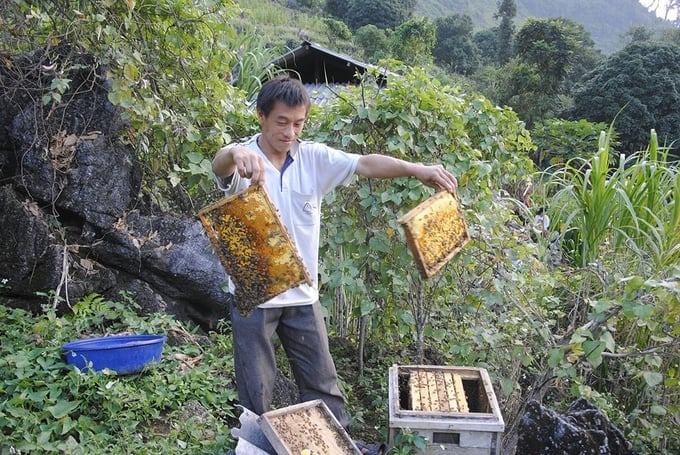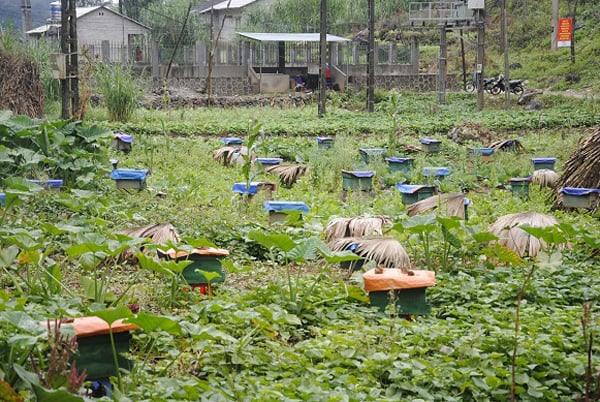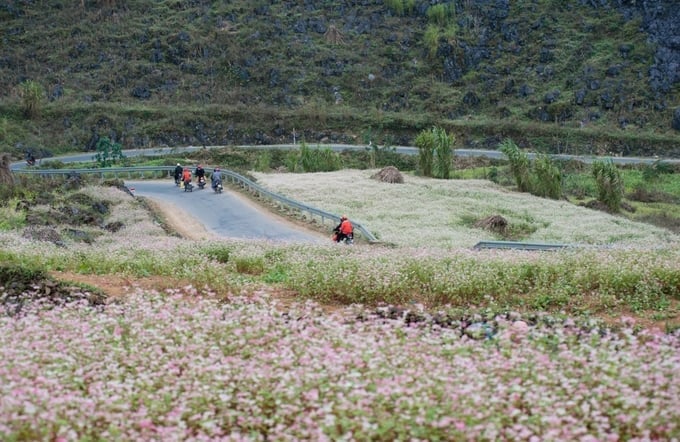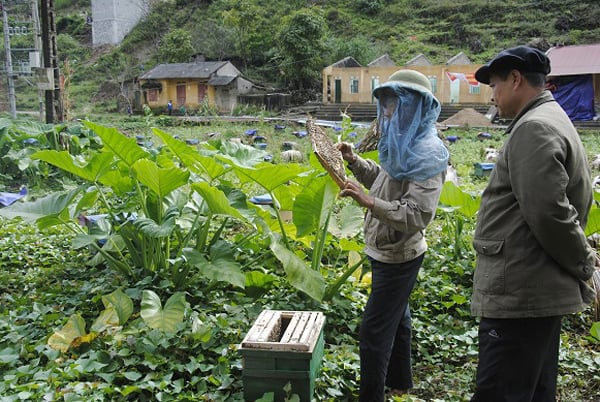June 16, 2025 | 20:57 GMT +7
June 16, 2025 | 20:57 GMT +7
Hotline: 0913.378.918
June 16, 2025 | 20:57 GMT +7
Hotline: 0913.378.918

Mr. Chang Vang Dinh in Sua Can Ty village, Can Ty commune, tending to his family's beehives. Photo: Kim Tien.
Several residents in Thai Phin Tung commune, Dong Van district implemented drastic measures against beekeeping in 2016. Namely, they decisively chased away non-native bee colonies brought in by residents from outside the commune who intended to harvest honey. In an extreme act, hundreds of foreign bee hives were discarded along National Highway 4C, leaving the owners of these bee colonies aggrieved at the hostile actions from the locals.
At that time, the Chairman of Ha Giang Provincial People's Committee advocated the locals' behavior, citing the reason as foreign bee species significantly impacted beekeeping activities, undermining the local honey brand.
Ha Giang province is renowned for its native plants such as buckwheat and peppermint. During the flowering season, local residents have an additional source of income from beekeeping in areas with these two plants, giving rise to local specialty products such as buckwheat honey and peppermint honey.
Thai Phin Tung commune possess spacious peppermint production areas with a substantial number of bee colonies. When residents from outside the commune introduced foreign bee colonies for breeding, local concerns arose that these foreign bees, with their robust physique, might fight with native colonies for honey when there is a shortage of peppermint flowers, potentially killing the native bee population.

A peppermint beekeeping facility in the Dong Van Stone Plateau. Photo: Kim Tien.
The fight to protect the local bee population saw the eager participation of the entire Ha Giang province. Notably, Dong Van District People's Committee in Ha Giang Province officially requested, through a written document, that organizations and individuals may only bring bees into the district for honey exploitation with the district's consent. Accordingly, the local government prioritizes allocating beekeeping sites for local organizations and individuals before considering placements for beekeepers from outside the district.
Ha Giang province's Department of Agriculture and Rural Development also prohibits residents in the four districts of the Dong Van Stone Plateau from using foreign bee breeds. Additionally, the Department recommended the districts' local governments to strengthen inspection efforts and prevent the introduction of foreign bees to exploit honey from the peppermint flowers. Prior to this initiative, Ha Giang province had issued official documents banning organizations and individuals from independently bringing foreign bee colonies into the area. Furthermore, the local government had requested the removal and relocation of non-native bee colonies within the province.
Ha Giang province's determined actions, with the goal of protecting local bee colonies and the brand of "peppermint honey," are dedicated efforts to safeguard their established reputation.
Ha Giang province has a long-standing reputation for its high-quality peppermint honey, known for its numerous benefits. During seasons of scarcity, honey prices can reach up to millions of Vietnamese dong per liter. The Intellectual Property Office of Vietnam under the Ministry of Science and Technology granted a Certificate of Geographical Indication registration for the Meo Vac peppermint honey product in 2013. Accordingly, the Geographical Indication covers the four districts of Dong Van, Meo Vac, Yen Minh, and Quan Ba.

In addition to buckwheat plants, the Dong Van Stone Plateau also features over 200 hectares of buckwheat flower production area. This area serves as a source of raw materials for beekeeping development. Photo: Huy Ha.
Dr. Phung Huu Chinh, an expert in honey bees, analyzed that the bee species currently being raised for peppermint honey in Ha Giang province is the indigenous Apis Cerana bee. This bee species, endemic to the high mountainous regions of Ha Giang province, boasts excellent cold resistance. From a scientific standpoint, the fight for honey and aggression between foreign and native bee colonies occurs when the concentration of feeding points is high, and the bee colonies are too dense with a limited number of flowers. The robust characteristics of the foreign bee colonies, which are larger in population, result in significant damage to the native bee species.
The native bee species in Ha Giang produces honey with a more delightful aroma compared to that of foreign bee species. On the other hand, the native bees' honey features lower viscosity and density compared to that of honey brought in by foreign bees. There is a need for demarcation within planned beekeeping areas, with a focus on removing foreign bees, to avoid conflicts. If foreign bees are present within shared areas, the minimum safe distance between different bee hives must be 2 to 3 kilometers.
The annual yield of "Meo Vac peppermint honey" is estimated at 163,000 tons, with prices at two to three times higher compared to honey collected from other flower species. Due to its high economic value, beekeepers from other provinces have flocked to exploit local peppermint flowers, disrupting production and causing economic losses to local ethnic minority communities engaged in beekeeping.
With the aim of sustainable protection for the beekeeping profession as well as the quality of peppermint honey, Dong Van District People's Committee has developed a regional production plan to protect peppermint plants within the district. Dong Van district houses over 1,124 hectares of peppermint flower production area, which is distributed across 16 out of 19 communes and towns. Major concentrations are found in the communes of Lung Tao with 92 hectares, Van Chai with 200 hectares, Sung Trai, Sa Phin, Thai Phin Tung with at least 100 hectares each. The only three communes without peppermint flowres are Lung Cu, Ma Le, and Pho La.

Beekeeping in Ha Giang province provides significant income for the locals of the highland region. Photo: Kim Tien.
Mr. Ha Van Tuyen, Deputy Head of Dong Van district's Department of Agriculture and Rural Development, stated that the total number of bee colonies in the district is estimated at 15,152 bees, with nearly 8,000 managed by 841 households and 4,384 managed by 7 organizations. These organizations include the beekeeping cooperative group in Kho Cho village, Van Chai commune; Hoa Da and Truong Anh Companines in Lung Phin and Sung Trai communes, respectively, Ha An Cooperative in Sa Phin commune; Pho Bang Breeding Center and Thanh Do Cooperative in Thai Phin Tung commune; the beekeeping cooperative group in Ta Lung commune. Additionally, 690 bee colonies can potentially be raised across 13 sites in the two communes of Sa Phin and Sung Trai.
The local government of Sung La commune is implementing a project to diversify biological resources, with an investment capital of 450 million Vietnamese Dong to support 24 households in managing 450 bee colonies. Additionally, the commune is developing a project for the beekeeping chain in the coomunes of Thai Phin Tung and Sa Phin, which involves 30 households managing 1,905 colonies. Accordingly, the local Department of Agriculture and Rural Development has been appointed the project owner with a capital of over 2 billion Vietnamese Dong.
Ha Giang Provincial People's Committee issued Document No. 2960 dated September 18, 2023, instructing the local Department of Science and Technology and the People's Committees of four highland districts to strengthen the management and development of the "Meo Vac" geographical indication, and the quality of Ha Giang province's peppermint honey products. The directive emphasized the need for strict adherence to established requirements for production and protection.
The Department of Science and Technology, as the managing authority for the geographical indication, is responsible for guiding, inspecting, urging compliance; reviewing and amending the regulations for managing and using the "Meo Vac" geographical indication. The department has also been tasked with developing a management and development plan for the geographical indication and the quality of Meo Vac honey to ensure strict control as well as enhance value, quality, and sustainable branding.
A seminar on "Enhancing the efficiency of management, exploitation, and use of the 'Meo Vac' geographical indication for peppermint honey products" will organized on November 18, by Ha Giang province's Department of Science and Technology. The seminar will cover various topics including: managing, exploiting, and using the "Meo Vac" geographical indication; solutions to promote the export of peppermint honey to international markets; development direction for the production of peppermint plants to serve beekeeping in the geographical indication areas; new technological solutions to improve the quality of peppermint honey products, among many others.
Translated by Nguyen Hai Long
![Turning wind and rain into action: [4] Bringing climate bulletins to remote and isolated areas](https://t.ex-cdn.com/nongnghiepmoitruong.vn/608w/files/linhnhp/2025/06/14/1152-z6704423696987_15fd32ffc26d590d204d520c9dac6786-nongnghiep-151141.jpg)
(VAN) The Vietnam Agriculture and Nature Newspaper interviewed Mr. Vu Thai Truong, Acting Head of Climate Change and Environment at UNDP Vietnam, to gain deeper insight into how climate bulletins are delivered to farmers.

(VAN) In Tien Giang, a high-tech shrimp farm has developed a distinctive energy-saving farming model that has yielded promising results.
![Turning wind and rain into action: [3] 300.000 farmers benefit from agro-climatic bulletins](https://t.ex-cdn.com/nongnghiepmoitruong.vn/608w/files/news/2025/06/12/e5a48259d6a262fc3bb3-nongnghiep-125122.jpg)
(VAN) The agro-climatic bulletin has become a valuable tool for farmers in the Mekong Delta. After more than five years of implementation, the initiative is gradually being expanded nationwide.
![Turning wind and rain into action: [2] Providing forecasts to the people](https://t.ex-cdn.com/nongnghiepmoitruong.vn/608w/files/news/2025/06/12/e5a48259d6a262fc3bb3-nongnghiep-103927.jpg)
(VAN) In addition to improving the quality of hydrometeorological forecasts, putting forecast bulletins into practical use is crucial for production and disaster prevention.

(VAN) Blue carbon is receiving attention for its rapid absorption capacity and vast potential. It represents a promising nature-based solution to respond to climate change.
/2025/06/11/3507-1-161904_583.jpg)
(VAN) Seagrass beds and coral reefs serve as 'cradles' that nurture life in the ocean depths, creating rich aquatic resources in Vietnamese waters.
![Turning wind and rain into action: [1] Forecasting for farmers](https://t.ex-cdn.com/nongnghiepmoitruong.vn/608w/files/news/2025/06/11/e5a48259d6a262fc3bb3-nongnghiep-111919.jpg)
(VAN) Weather is no longer just a matter of fate. Forecasts have now become an essential companion for farmers in every crop season.